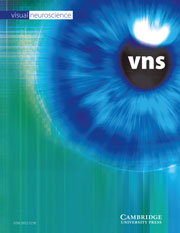Dr. William Grimes was awarded the 2014 VNS Young Investigator Award at the biennial FASEB meeting on Retinal Neurobiology and Visual Processing held in Saxtons River, Vermont. Dr. Grimes’ poster was selected from amongst 32 eligible posters by post-doctoral researchers early in their careers. The work presented by Dr. Grimes was conducted in the laboratory of Dr. Fred Rieke in the Department of Physiology and Biophysics at the University of Washington in Seattle. The work concerns the way in which rod and cone signals influence one another during twilight, when both are known to be operational. By cleverly choosing specific wavelengths of light stimuli, Dr. Grimes and his colleagues conducted human psychophysical experiments to demonstrate a non-linear rod/cone interaction that compromises our ability to see red spot stimuli using cones if they are presented shortly after a brief blue flash that predominantly stimulates our rods. Interestingly, similar non-linear interactions between rod and cone-preferring flashes were also observed by them amongst the output signals of ON ganglion cells, measured electro-physiologically in primate retina. By recording responses from various neurons in the primate retina, they pinpoint the site of this non-linear interaction to cone bipolar terminals, which is a point where rod and cone signals converge. Together, this work beautifully links retinal circuit mechanisms to human perception.
The Editors would like to thank the members of the selection committee for serving in this capacity.

The recipient, Will Grimes, and his 2014 FASEB poster.


